Warren Noble: on life, Norco, cricket, dairying and charity
Liina Flynn
09 May 2020, 9:00 PM
 Ex-Norco chair Warren Noble tells his history of dairying to Lord's Taverner.
Ex-Norco chair Warren Noble tells his history of dairying to Lord's Taverner.Warren Noble’s passion for cricket eventually lead him to becoming a charitable Lord’s Taverner and providing free meals to the residents of Our House in Lismore. As well as playing representative cricket, he found time to run a dairy farm, as well as sit on the Norco board for over a decade, influencing dairy politics in the region.
Warren, now 78, was born in 1941 on a 50 acre dairy farm in Eureka, which he and his wife ran until the deregulation of the dairy industry in 2000.
Dairy farming
“I was born into dairy farming and I learned from my dad, Bob,” Warren said. “In the 1950s, the whole family helped out on the farm – whether it was treating calves or sweeping a yard.
“I remember every bit of land from Casino to Byron Bay and Nimbin had dairies and Norco had 3000 suppliers for the Richmond Tweed area.
"There are only 180 suppliers now. These days the farms are bigger and produce more milk.”
“We would get up at 5am to milk the cows – we weren’t the earliest farmers in district.
“Dad was one of the first to get milking machines in the war years - lots of farms were still hand milking.
“As the years went on, we bought a couple more farms and by the time we closed the dairy, we had 200 cows."
School on horseback
Warren said each morning, he would catch his horse and ride it the three kilometres to Eureka School.
“A few students rode horses to school,” he said. “I left school at 15 and I was keen to be a farmer and apprentice under dad.
“I specialised in pigs and took over that area of the farming and made it bigger so our produce was cream and pigs.
“I eventually married my wife Heather in 1962 we had three children. By the time I was 27, we took over running the family dairy.
“I was madly keen on cricket as well.”
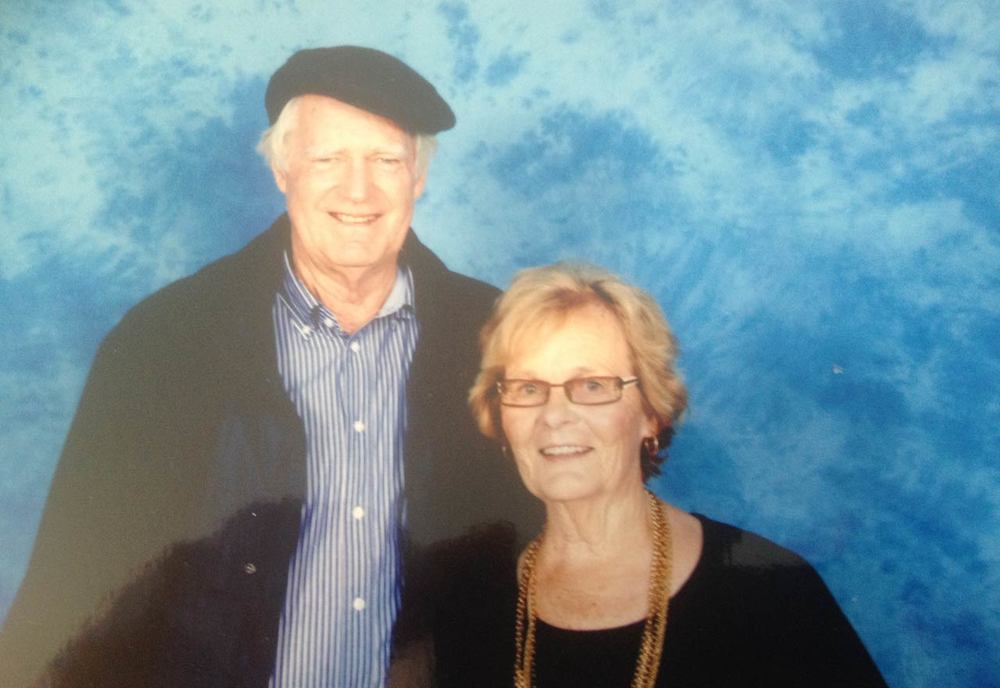
Warren and his wife Heather.
Cricket
Running a dairy with early morning starts was a big responsibility for Warren and it made it difficult for him and his family to leave the farm for a day, let alone for a holiday.
But still, he found time to play cricket.
“Like any passion, I didn’t find a lot of time to practice, but I played every Saturday competition and went to away matches,” he said.
“I played for Clunes district at first, then I was on the North Coast team when I was 17 and I was picked to play against New Zealand.
“I became team captain for four years until 1962, and that gave me exposure as a player.
“I was lucky enough to play four tours with the NSW team and I played South Australia in Lismore and the ACT team in Tamworth.
“Considering I was a dairy farmer, that’s as good as you get,” he said. “It wasn’t an easy life trying to run dairies, have kids, play cricket do everything else."
Warren met local cricket legend Stan Gilchrist when they went to coaching school in Sydney together. Warren watched Stan move into playing representative cricket – an opportunity he didn’t have as he held the responsibilities of being a farmer.
Stan became the catalyst to Warren joining the Lord’s Taverners in later years.
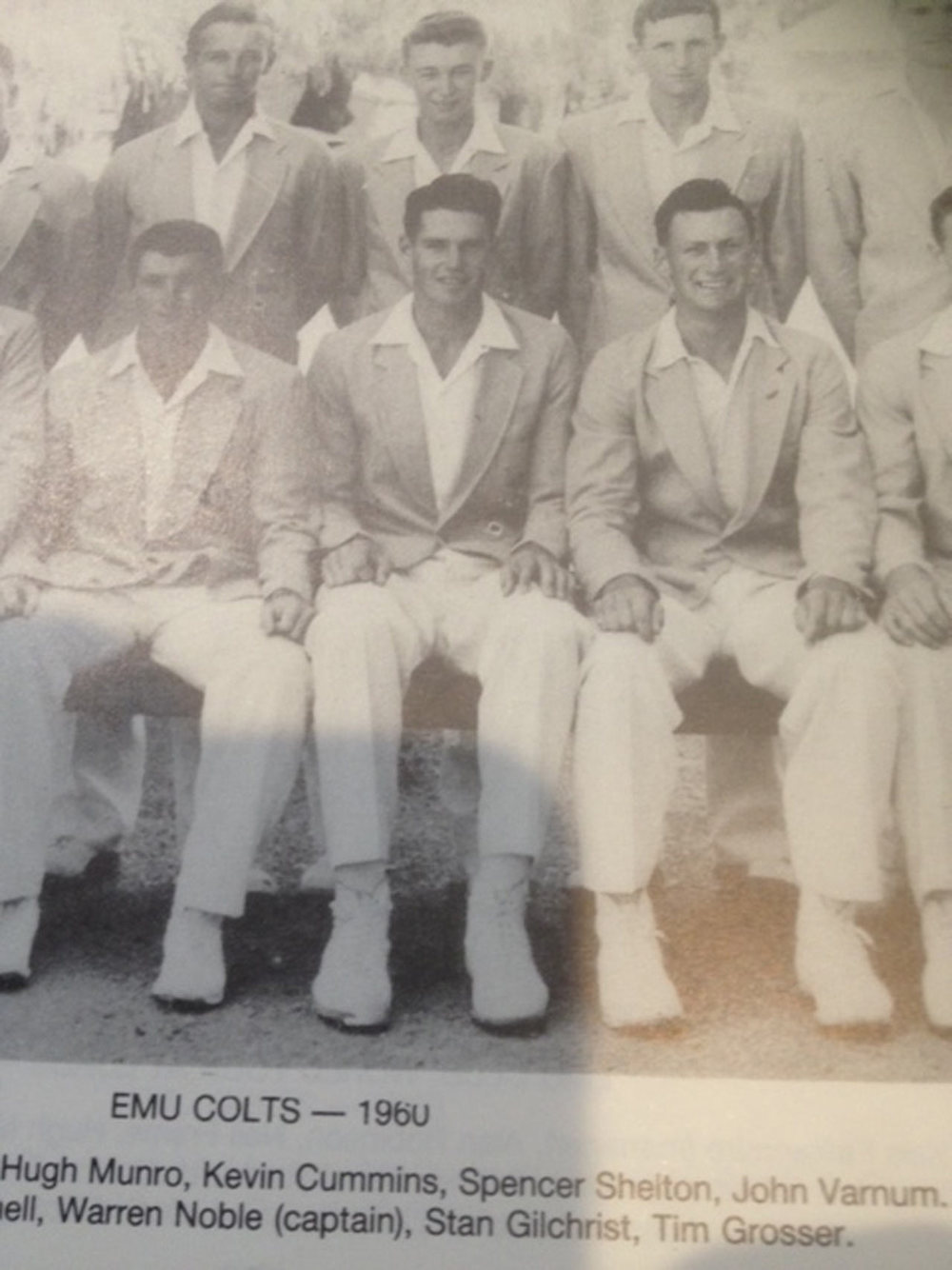
Warren Noble and Stan Gilchrist in a cricket team photo from 1960.
Norco
At the age of 29, Warren got involved with the board of local dairy cooperative, Norco.
“Since I was 15, I went to Norco meetings with my dad and I got involved with the dairy farmers association in my early 20s,” Warren said. “That’s when the Norco deputy chair asked me to stand for the board.
“It was very competitive – there were three vacancies and 12 nominations and I got elected that year and stayed on the board until 1997. I was chair for 10 years and deputy chair for seven.
“I was heavily involved with dairy politics in a time of big changes to the industry.
“I was on the dairy planning group in the 1990s and travelled to Sydney for meetings once a week.
“With so much to do, I employed someone to do the milking for me five days a week.
“Looking back, it never gave Heather much opportunity to get away from the dairy with the milking lifestyle where you had to be there twice a day.
“It’s a great lifestyle, being close to the family and not travelling to work every day, but you can’t go away for a day and not come home – at 4pm the milking needs to be done.
“We were lucky that in later years we were able to take small holidays and stand back and get an overall picture of the world.
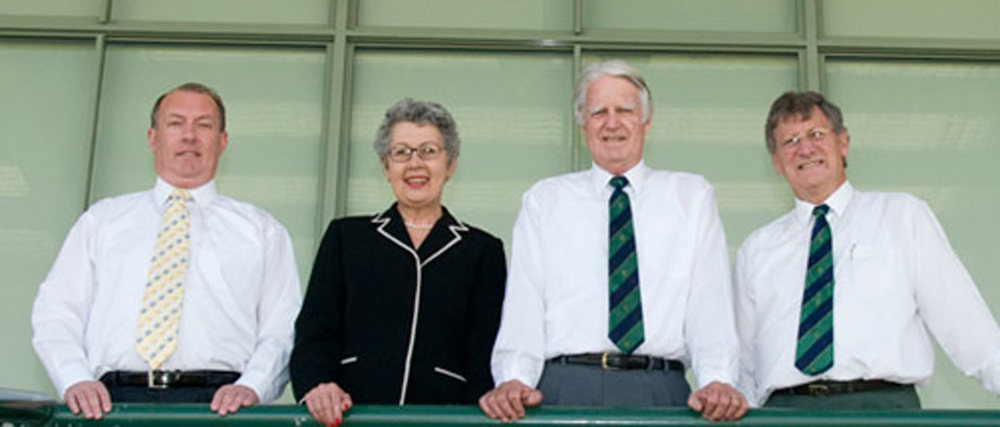
Pictured on Gordon Pavilion at Oakes Oval Lismore in 2010 were: Lismore City Council General Manager Paul Sullivan and Mayor of Lismore Cr.Jenny Dowell, with Lord’s Taverners Northern NSW Branch President Warren Noble and Branch Chairman Stan Gilchrist.
Heart attack
“When Heather had a heart at 44, it have me a jolt – I thought about how there was a world we needed to see.
“We went to Sydney so she could have a bypass and the doctors said she may not be round for more than 5 years, so we started to go on trips. Now we’ve been to Europe, England, America, Asia and New Zealand.
“We love travelling, especially in the years since we closed the dairy.
“My wife is a miracle lady and she’s still around after having 13 stints in her heart. I’ve been lucky.”
Dairy politics
“When I was Norco chair in the 1970s, it was a difficult time for farmers - we were excluded and couldn’t get our North Coast milk into Sydney markets. We had to fight for it.
“At the same time, each State had its own dairy industry and we also couldn’t send our milk over the Queensland border.
“It was crazy, but that’s the way politics was at the time. Later, we got some access to Queensland and farmers’ returns improved when Norco bought a Beaudesert company to get access to Brisbane.
“When deregulation came in in 2000, it took away the State borders. It decimated the Queensland dairy industry as farmers got out of the business because returns were too low.
“I retired from Norco in 1997, but when milk deregulation came in, I closed my dairy as a one man protest against it.
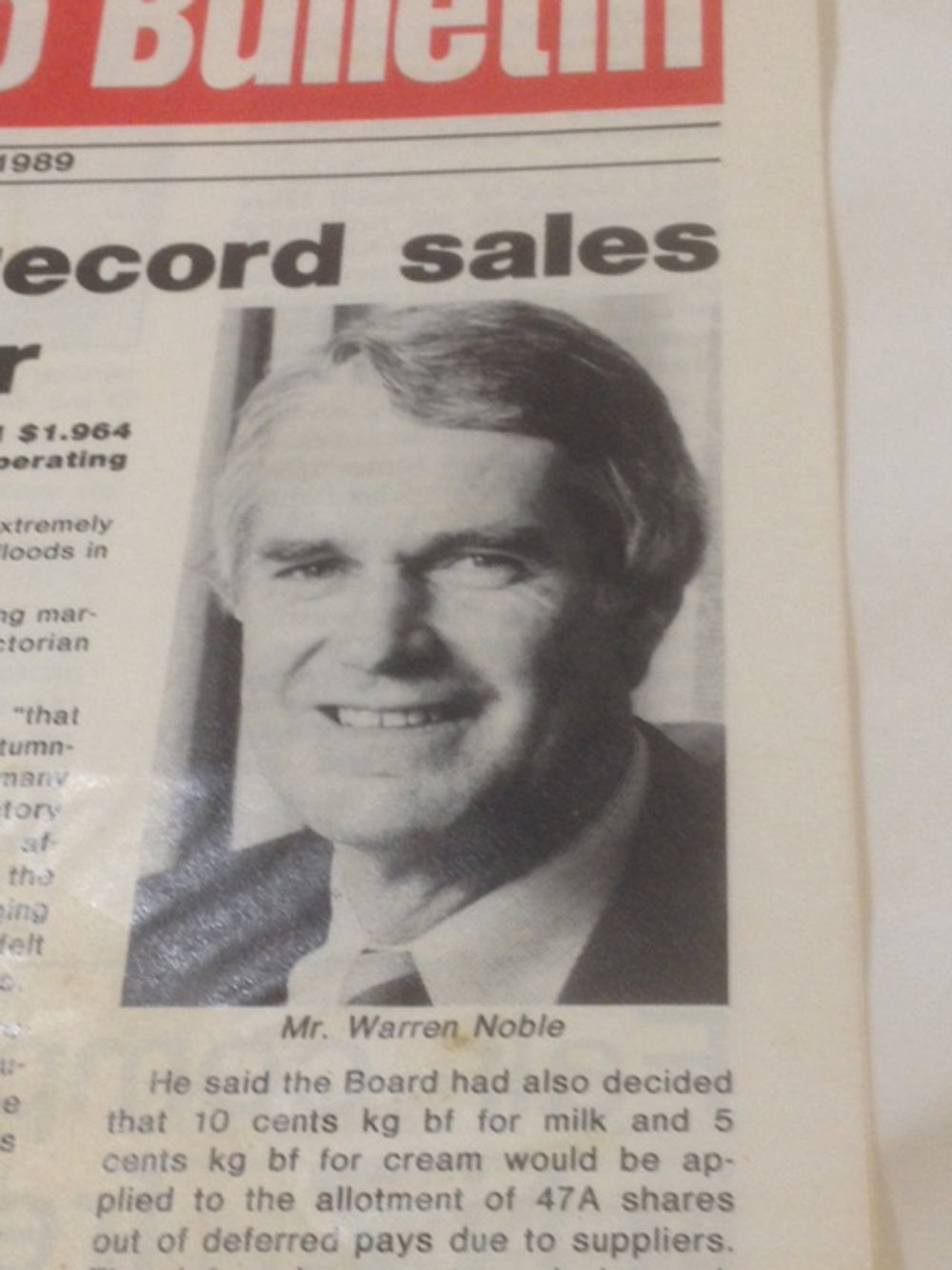
Warren as Norco chair, made the newspaper in 1989.
Deregulation
“Deregulation has been a disaster for farmers. There’s only been a few years when farmers got a reasonable return on milk.
“These days, Norco is well positioned as an organisation – it’s a cooperative owned by suppliers.
“There’s no regulation anywhere now – the supermarkets deal with the factories now and farmers got devastated.
“Coles brought in cheap milk prices and kept the price to farmers at 50-60 cents a litre - it should be 70c.
“When I was chair on Norco, milk was 57c a litre and we got 35c – and that was 35 years ago.
“Supermarkets dictate the price to pay – they say ‘we charge customers this and you take what’s left’.”
Warren believed the groundwork from his time on the board positioned the organisation well to deal with the way dairy politics went in the following years.
He believes that one of the biggest challenges at the moment to the dairy industry is the take up of foreign investment.
“Japanese companies which own shares in Australian dairy organisations are selling to the Chinese now,” Warren said.
“The Chinese are interested in food security for the future. They are not interested in the farmers and what they get.
Got out alive
“I wanted to fade into sunset after Norco - few chairmen got out alive.
“A lot of the Norco chairmen died in office and some were removed and bitter. I was one of two who left the board of own choosing at the time - and I was happy .
“I didn’t get involved with any squabbles - they sacked the general manager a few years later in the late 1990s, then deregulation came in and Greg McNamara came on board and did a good job of pulling it all together. He’s still there now."
Lord’s Taverners
Stan Gilchrist - former cricketer and champion for charitable organisation the Lord’s Taverners - remained good friends with Warren throughout the years.
He was even at Warren and Heather’s wedding day.
“Stan used to be a school teacher and inspector. He moved to Lismore 30 years ago and he retired from school work," Warren said.
“Stan was watching Adam (Stan’s son and former Australian cricketer) play cricket one day and he ran into an English commentator who said he should think about starting up a Lord’s Taverners association in Lismore.
“They were a group of cricketers who used to enjoy watching cricket from the Lord's Tavern pub and thought there must be more to life than cricket and beer – so they started a charity for recreational youth cricket and disability sports. Their catch phrase is to give the young and disabled a sporting chance in life.
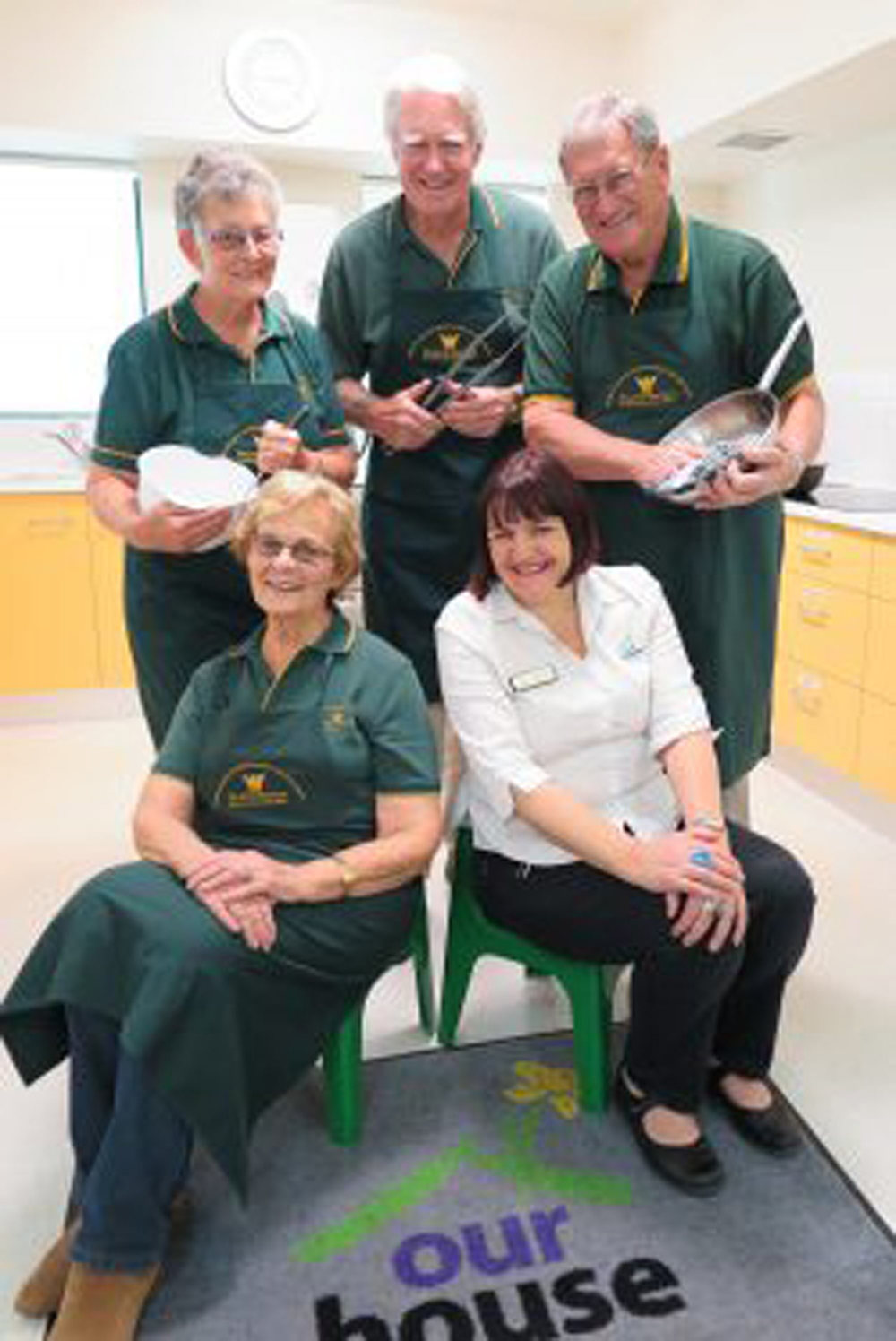
Warren and some of the dedicated people who made meals at Our House happen.
Lismore branch and Our House
“Stan is a great organsiser and with his passion, he started the Lismore branch of the Lord’s Taverners.
“Stan knew I’d been retired from Norco and he asked me to be president. I agreed, but stepped down a couple years later. I’m still an executive member.
“Adam was the patron of MacDonald house and he and Stan went to see what was being done to help kids in hospital in WA.
“When they came home to Lismore, the Our House facility was being completed in Lismore for cancer patients to stay in and we thought we would put meals on for those staying there.
“We had enough Lord’s Taverners members for six teams to put on one meal every week. We started twice a month initially and it was going so well that we called a public meeting and got about 60 people turn up – it blew us away.
“From that, we got about 36 teams of five or six people from church groups, real estate firms, Lions, Rotary, and fire brigades - and they each on dinners every Tuesday and Thursday night.
“Most teams only do it twice a year. It’s a great service to the residents –they get two free meals a week and a chance for conversations.
“The teams that do it feel so good they have done something great – they say they get more out of it than they put into it.”
Warren said the Lord’s Taverners also raise money to help young people with financial problems to go to university, or to travel overseas to play cricket.
“The North Coast branch of the Lord’s Taverners is the now the strongest and most active one in Australia,” he said.
Covid-19
Warren said since coronavirus restrictions were brought in, the Lord’s Taverners haven’t been able to put the regular dinners on.
Recently, Our House fundraising coordinator Rebekka Battista and Steve Mackney from Football Far North Coast joined forces with the Lord’s Taverners to call for the community – particularly the sporting community - to donate food and money to feed the residents of Our House and those at the Winsome Soup Kitchen.
Read more: Sports players urged to get off the bench and into community
The future
“I’m helping my wife with health issues at the moment,” Warren said. “She’s 80 years old and we have great kids and grand kids," Warren said.
“I’ve had enough compromises and fights and political arguments over the years – but life has been satisfying.
“I’ve had a blessed life.
“I’ve seen the dairy industry in the late 90s be the most stable it’s been. I was a little cog in a big wheel when deregulation took it away and the rug was pulled out from us.
“We had the second best dairy industry in the world, apart from New Zealand - and they had govt support. It’s tragic.”
To find out more about the Lord’s Taverners, visit http://www.lordstaverners-northernnsw.com.au/
Read more about the work of the Lord Taverners and how you can help: Sports players urged to get off the bench and into community
FOR SALE/OPEN HOMES



